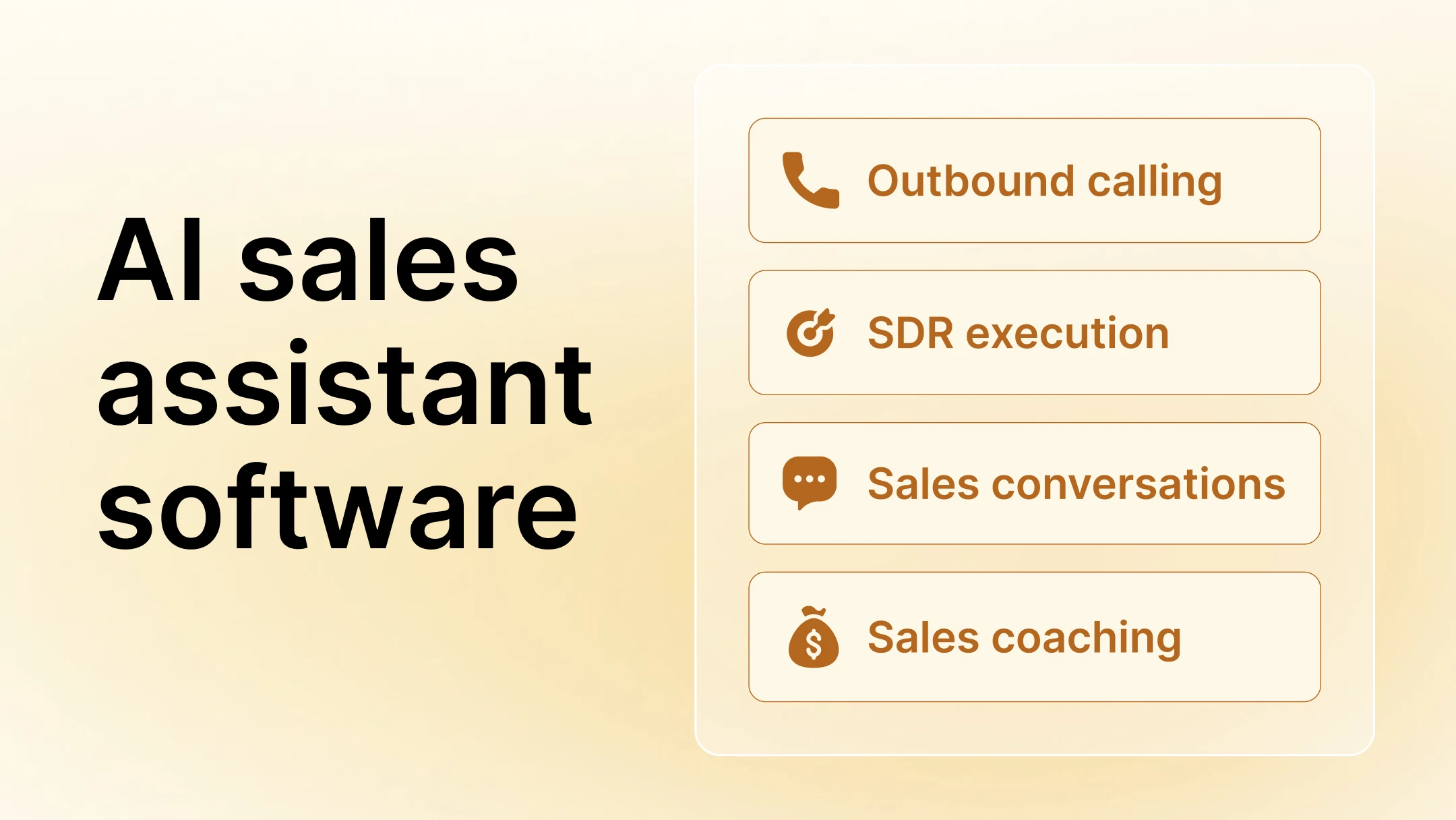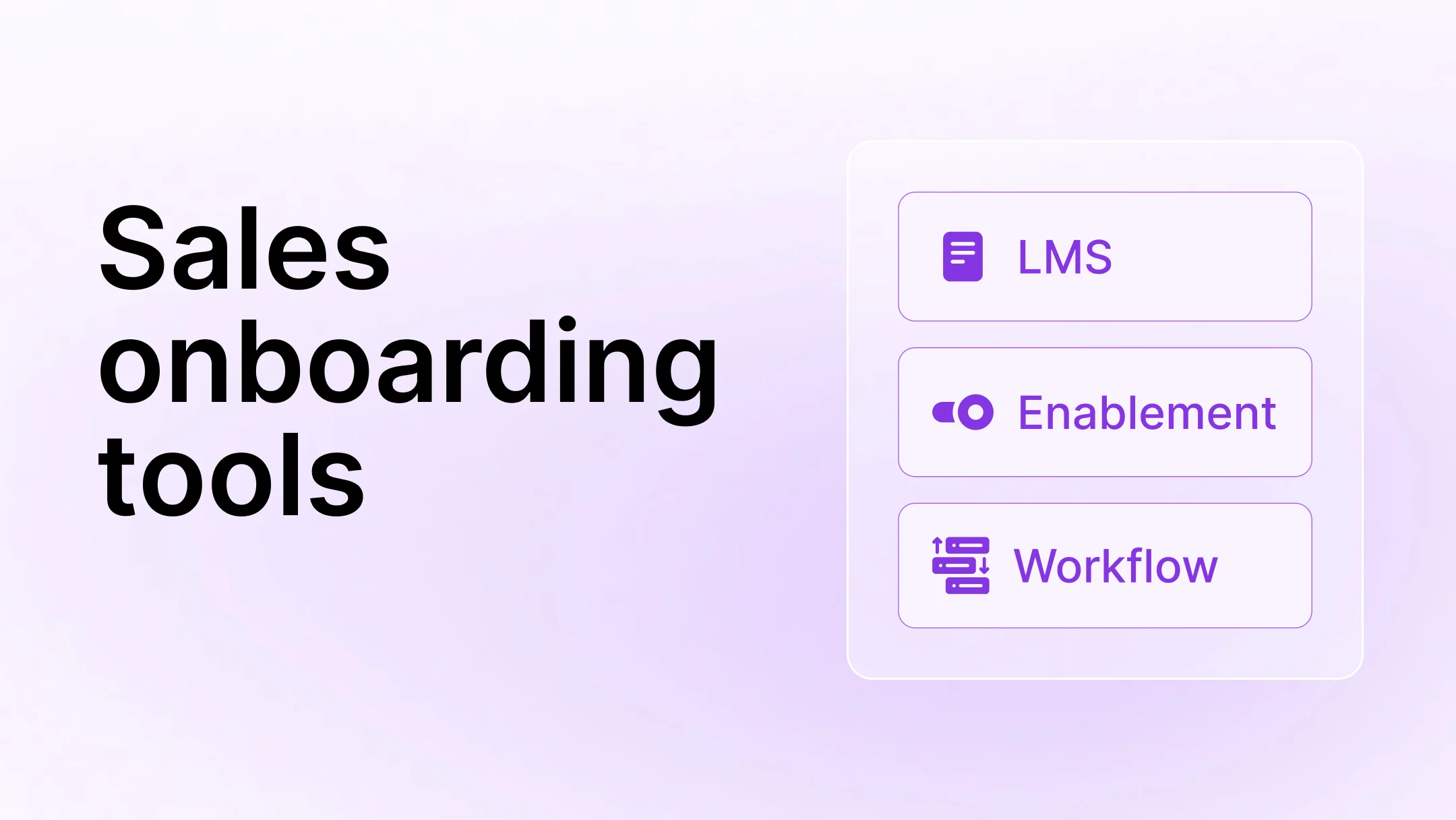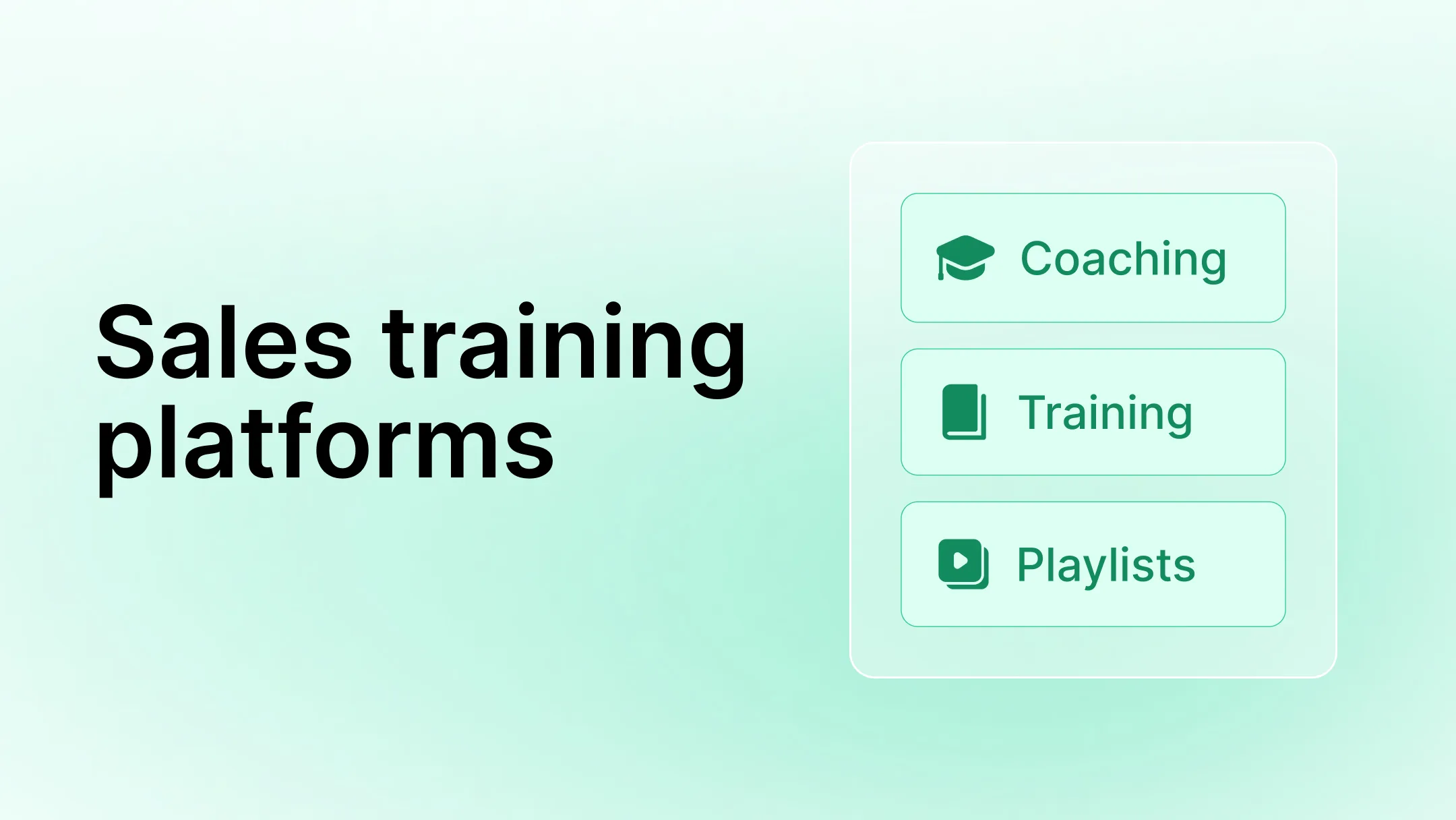Master selling to different personality types: Assertive, analytical, amiable, expressive buyers
Table of Contents:
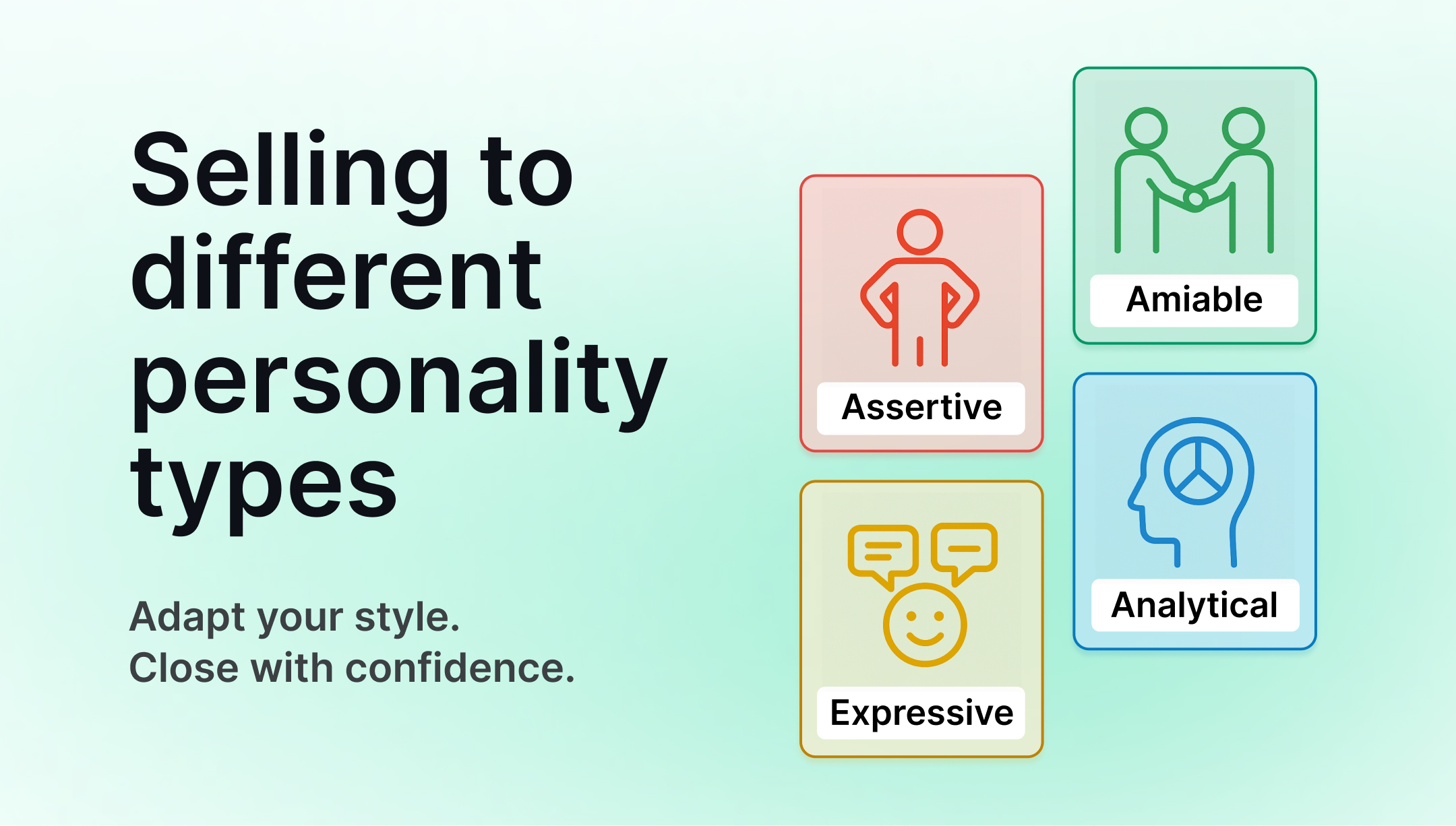
One deal slipping can throw off your entire forecast.
And in enterprise sales, that risk is even higher. The deals are longer, more complex, and packed with stakeholders, which means more room for misalignment. Tone, pacing, decision style... it all matters more.
High-stakes buyers are also more cautious. If they don’t feel confident in the rep, they won’t move forward, no matter how strong the product is.
You can’t brute-force your way through a complex deal. You have to build trust. And that starts by making the buyer feel at ease.
Selling gets easier and faster when your pitch matches how the buyer thinks.
That’s the power of selling to different personality types. Here’s how to do it and how to coach your team to make every deal feel like a better fit.
The importance of personality in sales
Buyer personality plays a bigger role than most teams realize. Two VPs with the same title can hear the exact same pitch and walk away with completely different takeaways. One focuses on ROI and timelines. The other cares more about team dynamics and post-sale support.
This is where personality typologies or frameworks like DISC, Merrill-Reid Social Styles, and Keirsey Temperaments come into play. Each breaks buyers into four core behavioral types. The names are different, but the patterns line up.
DISC uses dominant, influential, steady, and conscientious. Merrill-Reid calls them driver, expressive, amiable, and analytical. Keirsey uses guardian, idealist, artisan, and rational.
All of them are backed by decades of research in behavioral psychology and organizational behavior. And all of them give you a sharper lens into how people prefer to think, speak, and decide.
While the labels differ across DISC, Merrill-Reid, and Keirsey, the underlying patterns are strikingly similar. To cut through the noise, we’ll use a unifying model: the four buyer personality types—Assertive, Analytical, Amiable, and Expressive.
The four buyer personality types
Each buyer type: Assertive, Analytical, Amiable, and Expressive, has a predictable pattern: how they listen, ask questions, weigh options, and say yes. The goal is to understand what drives their decisions so you can meet them where they are.
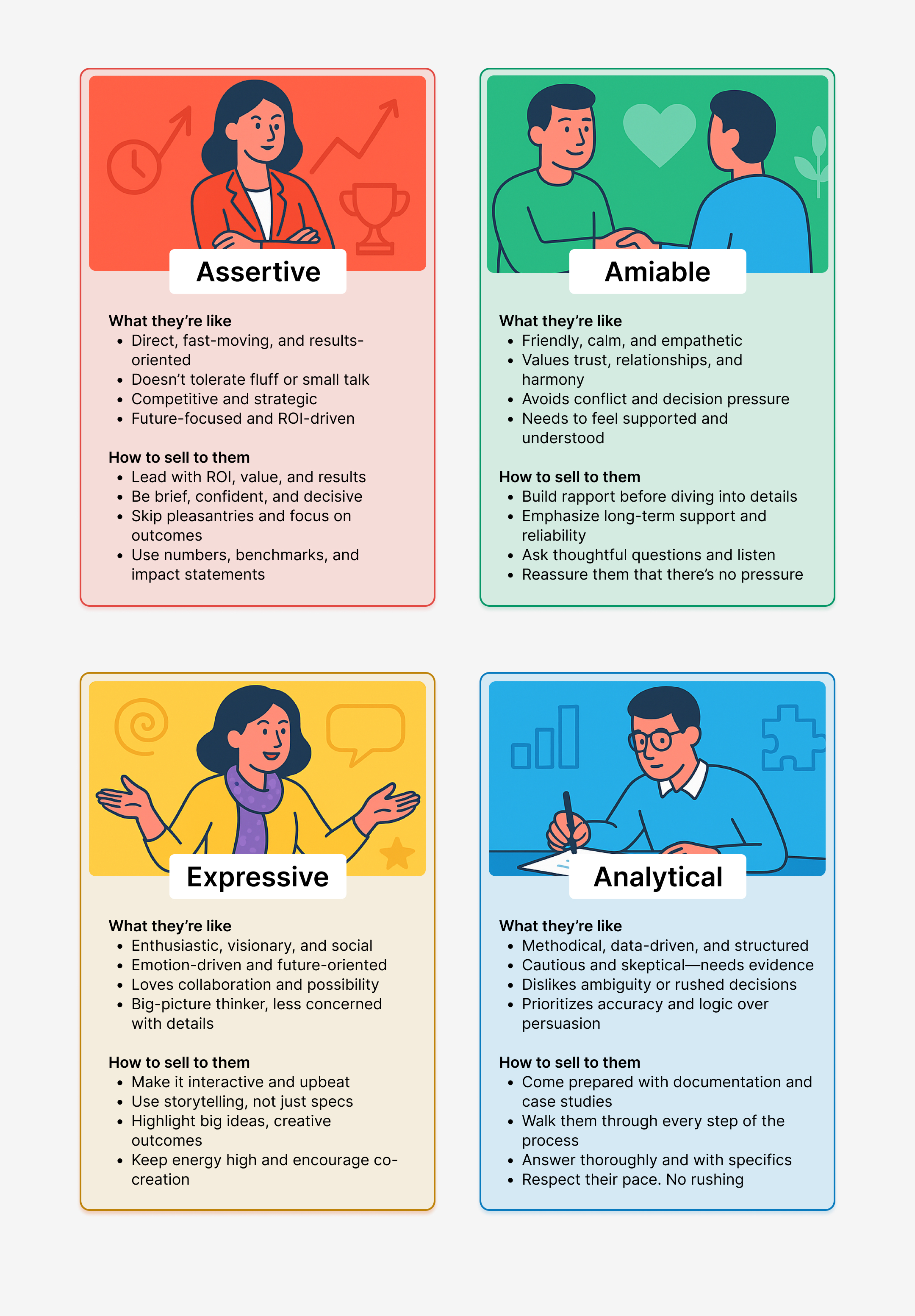
1. Assertive
DISC: Dominant | Merrill-Reid: Driver | Keirsey: Rational
What they’re like
Assertive buyers are goal-oriented, direct, and competitive. They move fast and expect you to keep up. They don’t want your life story. They want control of the process, clarity on outcomes, and zero fluff.
In Merrill-Reid, this is the Driver: high assertiveness, task-focused, and often blunt. Keirsey’s Rational type adds a strategic layer. These buyers are future-oriented and logic-driven.
How to sell to them
- Lead with value and ROI, not features
- Be brief and confident
- Use numbers, benchmarks, and business impact
- Skip the warm-up and focus on outcomes
Watch out for
If you get too chatty or vague, they’ll lose interest. This buyer respects clarity, decisiveness, and bottom-line thinking.
Example
You’re on a discovery call with a VP of sales. Ten minutes in, she says, “Let’s skip to how this helps us hit our Q3 target.” If you’re ready with real metrics and a direct answer, she’ll stay engaged.
2. Amiable
DISC: Steady | Merrill-Reid: Amiable | Keirsey: Guardian
What they’re like
They are warm, patient, and relationship-driven. These buyers thrive on trust, familiarity, and emotional safety. They don’t want to be sold to; they want to feel supported.
In Merrill-Reid, this is the Amiable: low assertiveness, people-oriented, prefers harmony over conflict. Keirsey’s Guardian adds a process-minded mindset. They value responsibility and loyalty.
How to sell to them
- Slow it down. Build real rapport
- Ask thoughtful questions and listen actively
- Emphasize support, reliability, and long-term partnership
- Reassure them there’s no pressure to rush
Watch out for
Push too hard and they’ll quietly back out. They don’t like conflict or aggressive closing tactics. They’ll ghost rather than say no.
Example
You’ve been nurturing a mid-market customer success leader for weeks. They’ve read every case study and asked about your onboarding process three times. This isn’t hesitation. It’s how they build confidence. When you match that pace and reinforce stability, they lean in.
3. Expressive
DISC: Influential | Merrill-Reid: Expressive | Keirsey: Idealist
What they’re like
Expressive buyers are energetic, future-focused, and emotion-driven. They love collaboration, possibility, and conversation. For them, traditional pitch decks feel flat; they want a vision.
Merrill-Reid calls this the Expressive. These buyers come with high assertiveness, high emotional responsiveness. Keirsey’s Idealist leans into meaning, purpose, and authenticity.
How to sell to them
- Make it interactive and upbeat
- Use storytelling, not just specs
- Highlight bold ideas, outcomes, and impact
- Keep the energy high and feed their curiosity
Watch out for
They’ll nod along even when they’re unsure. If you get too dry or technical, they’ll check out. You’re selling a vision, not just a product.
Example
You’re walking a CMO through a demo. She interrupts halfway through and says, “Wait, what if we could spin this into a campaign series?” She’s not derailing the call. She’s inviting you into her imagination. Follow her lead and build the vision together.
4. Analytical
DISC: Conscientious | Merrill-Reid: Analytical | Keirsey: Guardian or Rational
What they’re like
Analytical buyers are detail-oriented, structured, and risk-averse. They value precision over persuasion. They want to understand the logic before moving forward, and they’re quick to spot gaps.
In Merrill-Reid, this is the Analytical. Meaning low assertiveness, low emotional expression. In Keirsey, this could be Guardian (process) or Rational (logic), depending on their behavior.
How to sell to them
- Come prepared with details, metrics, and case studies
- Walk them through the process step by step
- Answer every question with clarity and evidence
- Respect their need for time to evaluate
Watch out for
Don’t rush them or gloss over the fine print. If you skip the details, they won’t trust the pitch. They need to understand it before they believe in it.
Example
You send a proposal to a head of finance. The next day, they reply with a spreadsheet of clarifying questions. Don’t be alarmed. That’s a buying signal. When you meet their thoroughness with precision, you build credibility.
Adapting to hybrid personality types
Here’s the curveball most reps miss.
Not every buyer fits neatly into one box. In fact, most don’t. You’ll meet assertive buyers who also value relationships. Or, expressive types who still want a data sheet before they sign.
That’s where adaptability becomes your superpower.
How do you spot the dominant style?
Listen closely during discovery. Are they asking about results or processes? Do they light up when you share stories, or when you show numbers? Their questions are your cheat code.
How do you sell to a mix?
- Lead with their dominant trait, then layer in the rest
- Watch for shifts in tone or pace. Those are signals
- Balance structure with flexibility in your pitch
- Ask, “Would you like more detail here, or should we move forward?” and let them steer
You don't need to guess perfectly. Try to adapt intentionally. When you show a buyer you’re paying attention to how they think, not just what they want, you build instant credibility.
Spotting personality types faster: how many calls does it take?
Reps don’t need three calls and a psychology degree to figure out who they’re talking to. Most buyer personalities show up clearly within the first 10 to 15 minutes of the discovery call.
You’ll hear it in the pace, tone, and focus of their questions. One buyer jumps straight to timelines and ROI. Another wants to talk about team onboarding. That’s your signal.
Avoma helps speed up pattern recognition. Reps can tag call types, add personality notes in real time, and review recordings with smart highlights that surface how buyers respond to different questions.
Alternatively, reps can use Ask Avoma to determine the buyer’s personality type in a flash. Just prompt it with:
Ask Avoma prompt to determine the buyer's personality type
Analyze the following sales call transcript to identify the personality type(s) of the prospect(s) based on these four buyer archetypes:
Assertive
- Direct, fast-paced, goal-focused
- Wants clarity, control, and outcomes
- Prefers metrics, brevity, and bottom-line impact
Amiable
- Patient, relationship-driven, emotionally safe
- Trust and familiarity matter most
- Responds well to reassurance and partnership talk
Expressive
- Energetic, vision-focused, creative
- Engages with storytelling, curiosity, possibilities
- Seeks meaning and emotional resonance
Analytical
- Detail-oriented, logical, methodical
- Requires data, proof, and a step-by-step process
- Avoids rushing and dislikes ambiguity
Instructions:
Analyze every prospect speaker in the transcript (identify them by name or role if available).
Identify the most likely personality type for each based on their tone, questions, pacing, language, objections, and focus.
Quote key phrases or behaviors that support your analysis.
If the speaker displays traits from more than one category, explain the dominant trait and how others may also show up.
End with a summary of how the seller should best adapt their approach to each identified type.
Output format:
Prospect Name or Role: [e.g., “VP of Sales – Jane”]
Likely Personality Type: Assertive
Supporting Evidence:
• “Let’s skip to how this helps us hit our Q3 target.” → Outcome-focused, direct
• Rarely engaged in small talk, asked for metrics early
Sales Recommendation:
Be concise, lead with ROI, and present hard numbers. Skip rapport-building and focus on tangible outcomes.
(Repeat this format for each prospect speaker)
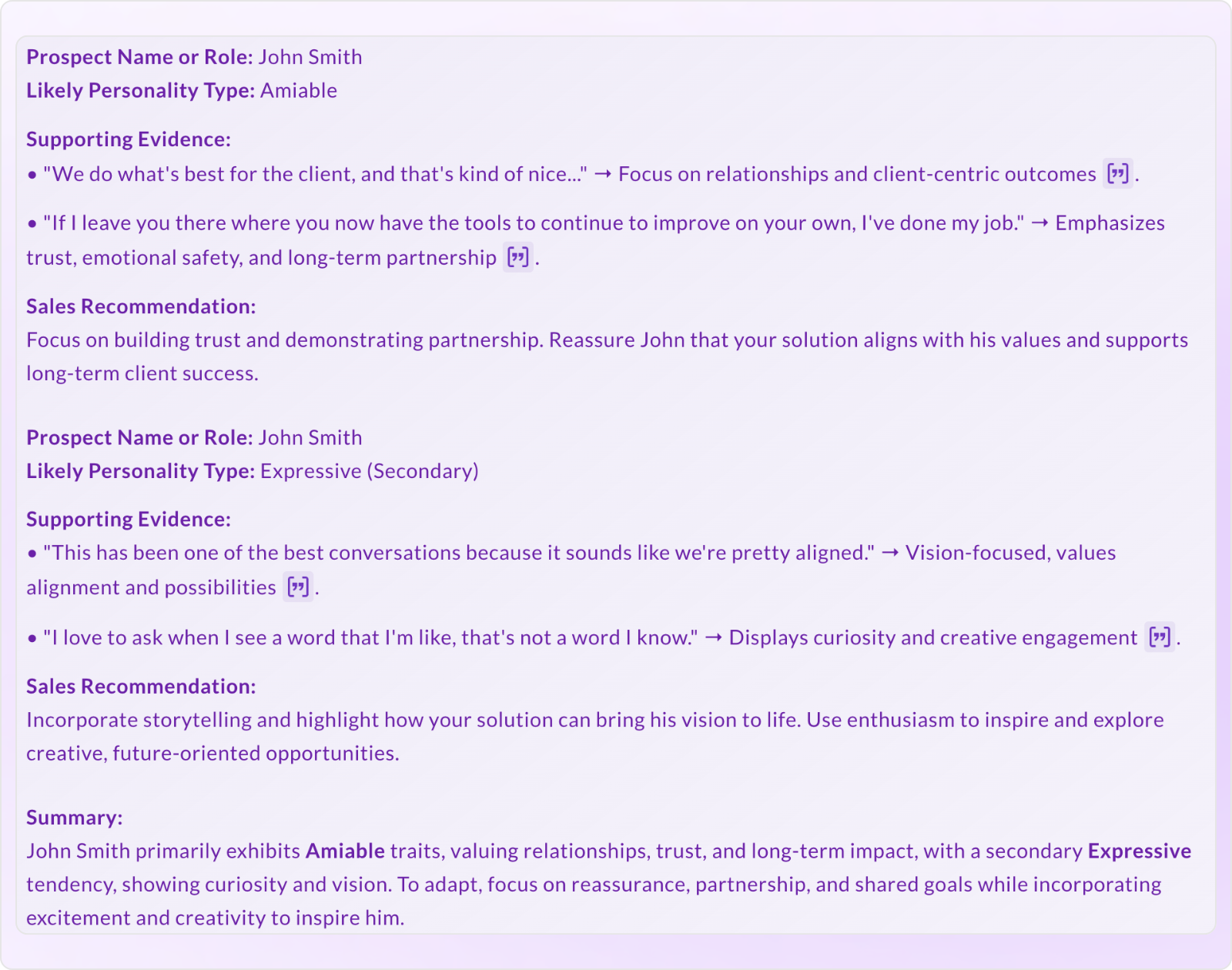
When to adjust sales methodology?
You don’t need to lock into a sales methodology before the first call. For starters, you can go with any discovery methodology like SPIN, Sandler, or your team’s default framework. The key is to listen to how the buyer makes decisions and then align your strategy from there.
Once it’s clear what drives them: speed, trust, logic, or possibility, that’s when you pivot.
Avoma makes that switch easier. You can switch to different templates and scorecards based on different buyer types. When a rep tags a prospect as expressive, they can use a template built for story-driven discovery. Or if it’s an analytical buyer, they can use a MEDDIC-style follow-up checklist.
Ask Avoma can also recommend the right methodology with a quick prompt
Based on the sales call transcript, determine which sales methodology (or methodologies) best fit the prospect’s overall personality and decision-making style.
If there are multiple speakers from the prospect side, analyze each of them individually. Then, synthesize your findings to recommend 1–2 sales methodologies that best align with the group’s behavior as a whole.
Use the following personality-to-methodology guidance:
Assertive (Dominant / Driver / Rational)
• Traits: Direct, goal-driven, blunt, outcome-focused
• Methods: Challenger or Command of the Message
• Tips: Lead with ROI and insights. Be brief and decisive.
Amiable (Steady / Amiable / Guardian)
• Traits: Warm, loyal, harmony-seeking, process-minded
• Methods: Consultative or Sandler
• Tips: Build trust, go at their pace, avoid pressure.
Expressive (Influential / Expressive / Idealist)
• Traits: Energetic, future-focused, collaborative
• Methods: SPIN or narrative-driven discovery
• Tips: Sell the vision. Use storytelling and emotion.
Analytical (Conscientious / Analytical / Rational or Guardian)
• Traits: Detail-oriented, logical, structured, skeptical
• Method: MEDDIC
• Tips: Use metrics, documentation, and process clarity.
Instructions for Analysis
Identify each prospect-side speaker (by name or role if mentioned).
For each, assign a likely buyer personality type and list supporting behavioral evidence.
Summarize how these individual styles combine.
Recommend one or two sales methodologies that best suit the group’s overall decision-making approach.
Justify the recommendation with concrete examples from the transcript (quotes, tone, pacing, objections, questions).
Provide a final tip for how the seller should tailor their follow-up.
Output Format:
Speaker: [Name or Role]
Personality Type: [Assertive / Amiable / Expressive / Analytical]
Evidence:
• “[Quote or paraphrase]” – indicates [trait]
• …
(Repeat for each prospect speaker)
Recommended Sales Methodology (1–2):
• [Method 1]
• [Method 2, if applicable]
Reasoning:
• Majority of the group leaned [e.g., analytical and assertive], focusing on [e.g., ROI, data, process clarity].
• Quotes: “Send over the implementation details.” / “We care about Q3 impact.”
• Group showed low emotional expressiveness, high outcome orientation.
Tip for the Rep:
Tailor the next touchpoint with a concise deck highlighting ROI, implementation plan, and relevant benchmarks. Avoid vague language or high-level storytelling.
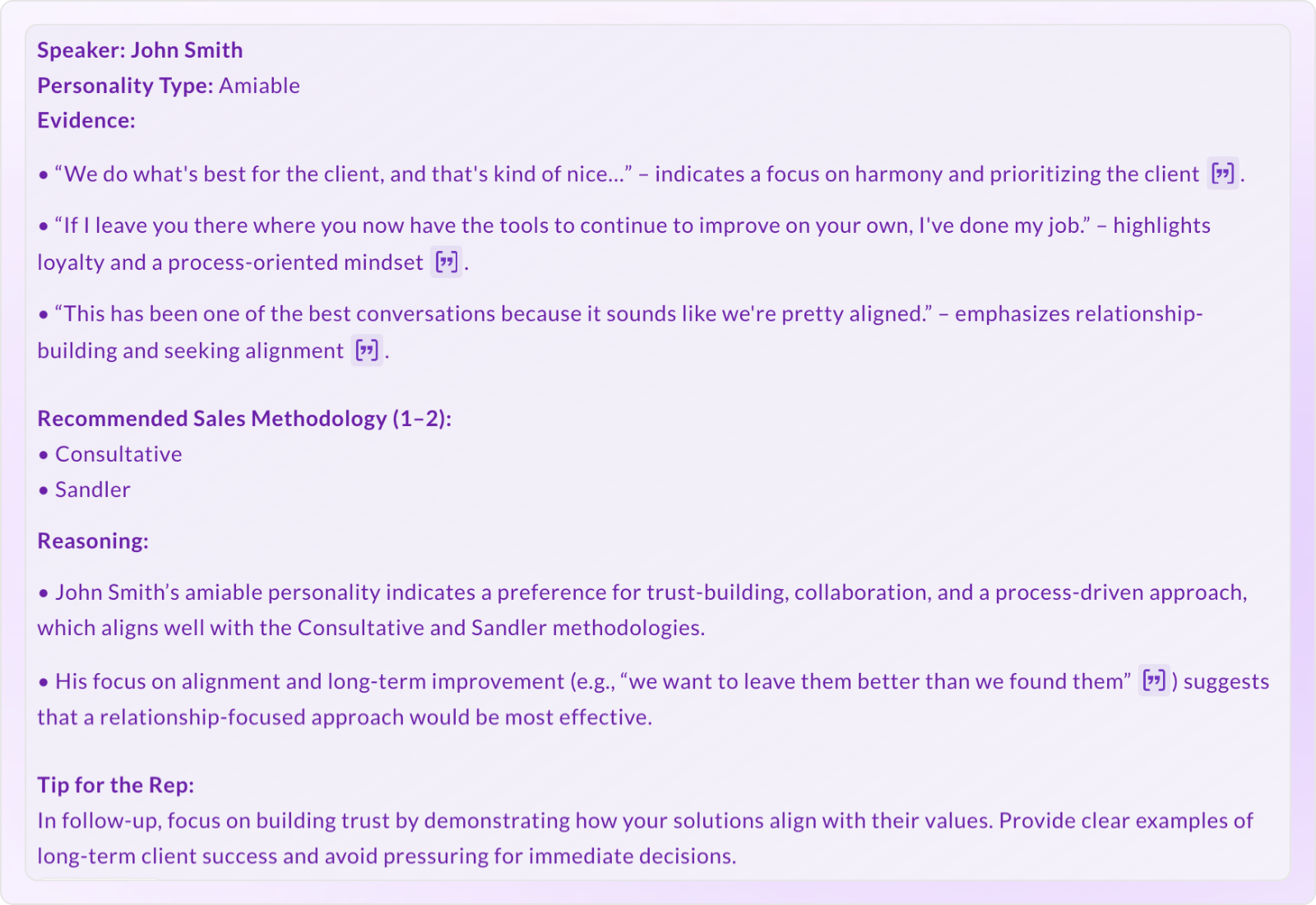
Implementing personality-driven selling in your strategy
Knowing the four buyer types is a start. Making them part of how your team sells every day? That’s the unlock.
This section walks through how to embed personality-driven selling into your workflow (and how to adapt your sales methodology based on how each buyer thinks).
1. Start with better discovery
If you’re only asking about budget and timelines, you’re missing the real intel.
To identify personality types early, focus on how buyers communicate. Not just what they say, but how they say it.
What to listen for:
- Assertive: Outcome-oriented, time-aware, direct
- Amiable: Relationship-led, collaborative tone, slower pacing
- Expressive: Big ideas, energetic tone, enthusiasm > specifics
- Analytical: Detailed questions, process focus, logic first
Once you pick up on these cues, you can adjust your language, tone, and even sales framework in real time.
2. Match your sales methodology to the personality
Most reps stick to one playbook. Top reps adapt it.
Here’s how personality-aware sellers flex their methodology:
- Assertive buyers: Use Challenger or Command of the Message. Lead with insights, strong POVs, and ROI. Skip fluff.
- Amiable buyers: Take a consultative or Sandler approach. Build trust, emphasize partnership, and create a safe buying experience.
- Expressive buyers: Lean into SPIN or narrative-driven discovery. Sell the vision first, then backfill with details.
- Analytical buyers: MEDDIC shines here. Walk through metrics, documentation, and process. Let logic drive the deal.
Reps should be trained to switch gears. Avoma can help.
3. Document personality cues in your CRM
You track buying signals. You track deal stage. Why not track how they think?
Create a custom field in your CRM for buyer personality type. Let reps tag it after the first or second call. Even if it’s not 100 percent accurate, it helps with:
- Deal handoffs between AEs and CS
- Personalized follow-up emails
- More effective multi-threading
You can also include this in your sales call QA rubric so managers can coach reps on how well they’re adapting to buyer styles.
With Avoma, this step becomes automatic.
Just create a custom personality field in your CRM and map it to a note field in Avoma. Once set up, Avoma will analyze the conversation, extract relevant cues, and sync it back to the CRM. No manual extra data entry needed.
4. Train your team to style-switch
Awareness is step one. Reps also need space to practice adapting in real scenarios.
Run regular role plays that reflect different buyer types:
- “You’re pitching an expressive CMO who cares more about vision than specs.”
- “You’re handling objections from an analytical CFO who’s focused on risk and data.”
Use these exercises to coach reps on switching tone, pacing, and methodology to match the way each buyer thinks and decides.
Even better, share real call snippets from tools like Avoma. Highlight moments where reps adjusted mid-call, read the room well, or shifted their strategy based on subtle personality cues. These real examples bring the concept to life and show your team exactly what great adaptation looks like in motion.
5. Equip your team with flexible assets
Dynamic selling requires dynamic tools.
Build modular content so reps can pick the right narrative in the moment:
- ROI one-pagers and case studies for assertive buyers
- Customer journey stories for expressive buyers
- Security docs and benchmarks for analytical buyers
- Success and onboarding playbooks for amiable buyers
6. Review pipeline with a personality lens
Pipeline reviews usually focus on stage progression, risk, and next steps. But if you want a tighter sales motion, layer in a personality lens.
Make this a standard part of weekly deal reviews, especially for in-flight or stuck deals.
What to ask:
- What personality style have you observed so far?
- How are you adjusting the tone, pace, and message to align with that style?
- Have you spotted any friction between their decision style and your current approach?
These questions force reps to think beyond deal mechanics. They start diagnosing buyer behavior, not just logging activities.
Use tools to speed this up:
- In Avoma, create and share call snippets by deal stage and listen for cues: tone shifts, buying signals, or hesitation
- Tag clips with personality typologies-style labels to build a shared coaching library
- Drop personality notes in call summaries so they carry through to CS or renewals
Shortcut: Create a personality cue checklist in your call review templates.
Example:
- “Buyer asked about impact in the first five minutes.” (Assertive)
- “Focused heavily on team adoption.” (Amiable)
- “Brainstormed use cases mid-demo.” (Expressive)
- “Asked for documentation and data set alignment.” (Analytical)
You can also feed these as smart topic prompts to Avoma so that it spots them better.
Over time, your team will get sharper at spotting patterns. And pipeline reviews will evolve from status updates into strategic deal calibration.
Make personality part of your sales motion
Many teams treat buyer personality as a soft skill; observed, occasionally acknowledged, but rarely built into the process. The highest-performing teams take a different approach.
They train sellers to recognize how buyers absorb information, evaluate risk, and move through a decision. This shapes every step, from discovery to follow-up to final pitch.
It becomes muscle memory.
Reps who learn to adapt this way build trust faster. They reduce friction and avoid the stalls that come from mismatched communication.
Personality isn’t extra. It’s foundational. When your team sells with that level of awareness, your pipeline moves with more speed and more control.
Ready to put this into practice? See how Avoma helps your team sell to every personality type, book a demo today.
Frequently Asked Questions






What's stopping you from turning every conversation into actionable insights?



